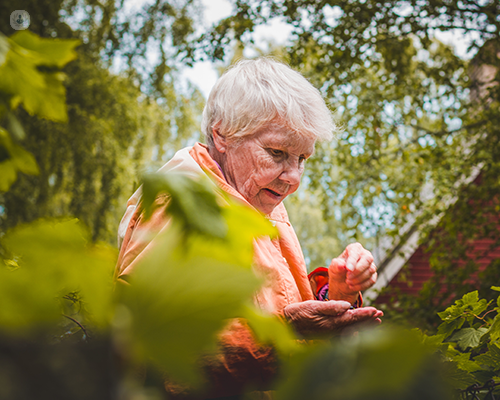How is vaginal cancer treated?
Written in association with:Around 250 people in the UK are diagnosed with vaginal cancer each year, most of them being older women.
Here to provide an expert insight into vaginal cancer, including risk factors, diagnosis and treatment options, is Mr Rahul Nath, one of London’s leading experts in gynaecology.

What is vaginal cancer?
Vaginal cancer is a rare cancer that starts anywhere in the vagina, which is the tube between the cervix and the vulva. Although most vaginal cancers arise from the thin layer of cells that line the inside of the vagina, vaginal cancers can also develop (albeit more rarely) in the glands in the lining of the vagina. Women over the age of 90 are more at risk.
What are the risk factors for vaginal cancer?
Due to the rareness of vaginal cancer, most of its risk factors remain largely unknown.
As of now, the most decisive risk factor for vaginal cancer is a human papillomavirus (HPV) infection, which accounts for 63 per cent of all vaginal cancer cases in the UK. Given that HPV is also a major risk factor for cervical cancer, the prevalence of vaginal cancer is greater amongst cervical cancer patients than amongst patients who never had any type of cancer.
In addition, patients with weakened immune systems (for example, due to HIV) are also at increased risk for vaginal cancer. This is because HIV makes it more difficult to clear infections of HPV.
How is vaginal cancer diagnosed?
The symptoms of vaginal cancer include:
- bleeding between periods
- bleeding after sex
- bleeding after the menopause
- smelly or bloodstained vaginal discharge
- pain during sex
- a lump or growth in the vagina
- a persistent itch in the vagina that will not go away
Despite this, one in five women with vaginal cancer do not have any symptoms. In these cases, vaginal cancer is diagnosed after a routine cervical smearing detects early vaginal cancer or abnormal cells in the vaginal lining (called vaginal intraepithelial neoplasia). These abnormal cells can be treated with a local excision in the vagina, which is performed under general anaesthetic.
In cases where symptoms are present, tests for diagnosing vaginal cancer include a pelvic examination and a colposcopy, which is an examination of the vagina performed with a specific magnifying tool (called a colposcope). A colposcopy, which takes 10-15 minutes to complete, is typically painless.
In some cases, a sample of tissue may need to be taken from the vagina to test for any abnormal cells that indicate cancer. The procedure, called a biopsy, can be performed under local or general anaesthetic depending on how the sample is taken. Patients may experience some brief discomfort.
How is vaginal cancer treated?
Treatment for vaginal cancer includes radiotherapy, chemotherapy, and surgery. The choice of treatment will be made after a discussion between the doctor and the patient.
Radiotherapy is the main treatment option for vaginal cancer.
It can be given in two different ways:
- As a beam of radiation delivered from a linear accelerator machine. This type of radiotherapy is called external radiotherapy. It is given over daily sessions of 25 minutes, from Monday to Friday.
- As a radioactive source directly inserted into the vagina. This type of radiotherapy is called internal radiotherapy or brachytherapy. It is given over two or more day-case sessions, or, during a short stay at the hospital.
Radiotherapy may be recommended instead of surgery or it may be used following surgery to prevent the recurrence of vaginal cancer in the lymph nodes. This type of radiotherapy is called adjuvant radiotherapy. In addition, radiotherapy may also be used if surgery could not remove all of the vaginal cancer in the first place, for example, if the cancer was in close proximity to important structures of the body.
Chemotherapy is generally given in combination with radiotherapy. This is called chemoradiation.
In some cases, however, chemotherapy may be used on its own to reduce the size of advanced vaginal cancers or to limit their symptoms. Different chemotherapy drugs may be used, alone or in combination.
- Surgery
The type of surgery that may be recommended will depend on various factors, including the size of the vaginal cancer, the location of the vaginal cancer within the structure of the vagina, and where the vaginal cancer has spread.
Small, early vaginal cancers are generally treated with a wide local excision. This is an operation that removes the area of affected skin together with a portion of healthy skin around it.
Other vaginal cancers, however, may require a partial or a total vaginectomy. This is a procedure that removes part or all of the vagina.
Vaginal cancers that have spread outside of the vaginal wall may need a radical hysterectomy. This is an operation that removes all of the vagina together with the uterus, the ovaries, the supporting tissue structures, and the surrounding lymph nodes.
In rare cases, some vaginal cancers may require a total pelvic exenteration. This is an extensive operation that removes all of the vagina together with the cervix, the ovaries, the fallopian tubes, the bowel, the rectum, and all or parts of the bladder.
Mr Rahul Nath is a leading specialist in gynaecology with more than 30 years of experience.
If you require expert treatment and management for vaginal cancer and wish to consult your options, do not hesitate to visit Mr Nath’s Top Doctors profile today.


